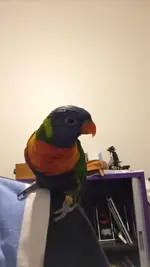The first couple of months that a bird spends in a new home with new people are just the settling-in phase. You can't really assume that the way that they act during their first month or two in your home is how they are going to act after they settle-in, feel comfortable, feel secure, etc. So since the bird was supposed to be your sister's, I'm sure that she was the one spending the most time with her right after she was brought home. So because the bird was nervous, feeling unsettled, etc., she was just feeling-out the situation, and was interacting with your sister and being nice to her because your sister was the one paying her the most attention, and I'm sure she felt safe with your sister during that first month or two in a new place.
However, now that she's settled-in to your home and she's gotten used to the people, to the environment, to the daily routine, etc., she now is allowing herself to be herself. Unfortunately, when you bring home a bird into a home with multiple people, you cannot really choose what person or people the bird bonds with. Birds are like people, they like who they like and they dislike who they like. We can try to influence them to like a certain person by having that person be their primary care-giver, have that person give them treats, play with them, take them places, etc., but in the end they are going to bond closely with whomever they want to.
This happens quite often with married couples, and it almost always causes a huge issue. One spouse is the one who wants to get a bird, while the other spouse wants nothing to do with a bird. So they bring home a bird, and the one spouse does absolutely everything with the bird and for the bird, while the other spouse does absolutely nothing for the bird, they don't even look at the bird...and this person is the person that the bird chooses. And this breaks the heart of the person who wanted to get the bird in the first place. Plus, the other person wants nothing to do with the bird, and is forced to spend time with it, etc.
So it's quite possible that your bird has settled-in to your house nicely, after 2 months she feels comfortable, secure, safe, and is now starting to come out of her shell and express herself, and she apparently prefers you to your sister. Now this doesn't mean that she hates your sister, but she's most likely going to need some work/training in order to understand that this isn't allowed...I don't know if she's only biting your sister or if she's biting other people as well, but whenever she bites, doesn't matter who it is, they need to immediately say "NO BITES!" firmly, not yelling but just firmly, and then immediately put the bird down on the floor, and then turn their back on the bird and totally ignore the bird for 5 minutes, no less and no more. If the bird cries or walks over to the person it doesn't matter, the person must totally ignore the bird completely, keep their back to the bird, and not even look the bird in the eye. This is called the "shunning" technique, and it works wonders because they love attention and there's nothing that they hate more than being totally ignored.
As far as your sister wanting to bond with the bird, all I can say is that she needs to be the one who does all the "good stuff", such as feeding the bird, all the treats, etc. She needs to try to spend as much time as she can with the bird, talking to her gently, etc. Hopefully the bird will eventually come to again like your sister and want to spend time with her, but it's probably going to be an uphill battle, if in-fact the bird is actually bonded to you already.



